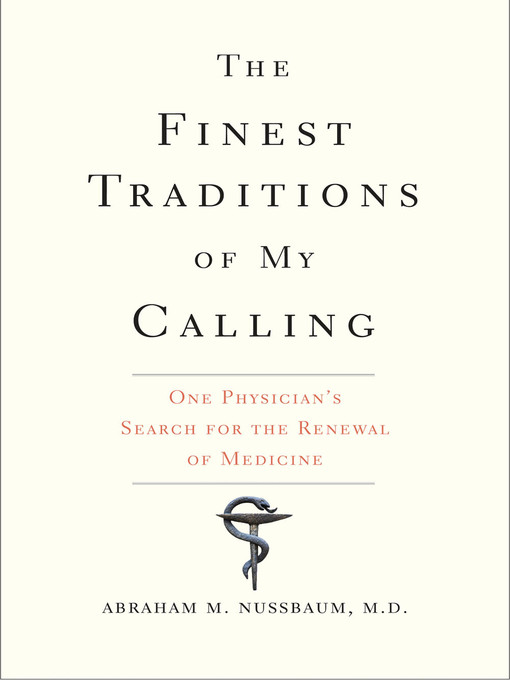
The Finest Traditions of My Calling
One Physician's Search for the Renewal of Medicine
یکی از پزشکان به دنبال نوسازی دارو
کتاب های مرتبط
- اطلاعات
- نقد و بررسی
- دیدگاه کاربران
نقد و بررسی

February 1, 2016
For more than a century, veteran physicians have written reports deploring the state of their profession, and in this earnest account, Nussbaum, director of adult inpatient psychiatry at Denver Health, argues that doctors have become unfeeling scientists dedicated to efficiency and income. He says that medical schools, aware of the problem since the 1990s, have begun teaching ethics, cultural sensitivity, and communication, as well as assigning readings outside of medicine. Nussbaum sees these efforts as admirable, but he suggests this attempt to produce physicians who are both scientists and humanists reinforces their distance from patients, whom they should see as suffering fellow humans. Nussbaum describes current campaigns for evidence-based treatments, checklists, quality-improvement guidelines, and reduced hours for residents as misguided efforts to apply industrial standards to medicine. These efforts aim to improve outcomes (i.e., increase patients’ chances of survival, reduce mishaps) at the expense of care. Nussbaum maintains that medicine differs from all other industries, and that the way a doctor cares for a patient matters more than the outcome. Patients might value outcomes more, but they certainly yearn for the respectful, empathetic treatment that Nussbaum proposes and that is so often lacking. His insightful polemic reveals that current reforms in medicine are missing an essential element.

January 15, 2016
A career physician ponders the positive and negative aspects of how health care reform is transforming the delivery of care and the medical profession itself. Nussbaum's (The Pocket Guide to the DSM-5 Diagnostic Exam, 2013) passionate appeal for the "renewal of medicine" stems from his clinical career and psychiatry directorship at Denver Health and the many incarnations he's embodied there as a patient, educator, student, and ethicist. Clinical professionals view health care reform as a "series of competing initiatives," and the author cleverly equates it to sailing at sea following an unmarked course of undetermined duration rather than a "well-organized race" toward the goal of cost-efficient, effective, quality care. Nussbaum begins with memories of his time in medical school, clinical residency, and his early career as a physician, when he learned, however detachedly, "to see people as a compendium of parts and a source of income" and to step back to view modern health care through the lens of both the everyday consumer and caregiver alike. He relates wonderfully to an esteemed array of medical intellectuals such as disheartened doctor Abraham Verghese, who advocated for the integration of heart into health care. Nussbaum also relates prophetic metaphors of Canadian physician Sir William Osler and the proposals of radical health pioneer Archibald Cochrane. Nussbaum even considers noted surgeon and public health advocate Atul Gawande's suggestion of boosting generalized health care's productivity by using the Cheesecake Factory's operational business model. Particularly striking is the author's keen if underdeveloped commentary on the medical marijuana conundrum, which begs for further introspection. In sharing the many tribulations of real-life patients and physicians, Nussbaum unveils a thoughtful, well-rounded, yet thorny vision of the current state of medicine. His generous narrative offers clarity and direction on how the industry can avoid sacrificing humanity to the trappings of an industrialized, unsympathetic, automated version of health care. A revealing and stirring directive aiming to heal medicine from the inside out.
COPYRIGHT(2016) Kirkus Reviews, ALL RIGHTS RESERVED.

























دیدگاه کاربران